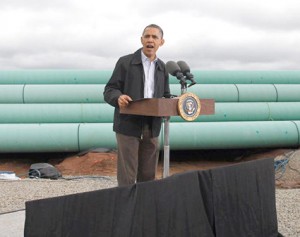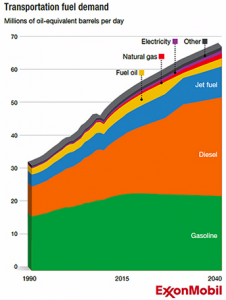587 item(s) were returned.
A diverse coalition of energy leaders put together by the Alliance to Save Energy (ASE) recently unveiled a set of recommendations for “Doubling US Energy Productivity by 2030.” Chaired by Senator Mark Warner (D-Va.) and National Grid U.S. President Tom King, the Alliance Commission on National Energy Efficiency Policy calls for growing the U.S. economy through investments, modernization and education. The Commission’s goal of doubling U.S. energy productivity (GDP/Btu) by 2030 was alluded to by President Obama in the State of the Union as was one of the Commission’s recommendations, an energy productivity “race to the top” type program. ASE… [more]
View InsightLast week Senator Lisa Murkowski (R-AK), the senior Republican on the Senate Energy and Natural Resources Committee, published a blueprint for energy policy, titled “Energy 20/20: A Vision for America’s Energy Future.” The blueprint offers ideas to “align federal policy with… our national interest to make energy abundant, affordable, clean, diverse, and secure.” Among the main ideas in Sen. Murkowski’s blueprint are: Establishing a national goal to become independent of OPEC imports by 2020 by increasing domestic oil, biofuel and synthetic fuel production. Approving the Keystone XL pipeline. Opening the Arctic National Wildlife Refuge to oil and gas drilling and… [more]
View InsightUniversity Distinguished Professor
Michigan State University, Dept. of Chemical Engineering
The last century can rightly be called the Age of (Inexpensive or ‘Cheap’) Oil as world oil consumption grew from about 20 million tons per year in 1900 to just under 400 million tons per year in 2005. Since 2005, however, world oil consumption has been nearly constant despite high demand and record high oil prices, which indicates that we simply cannot produce oil any faster. And since oil is not renewable, eventually the production (and therefore the consumption) of oil must decline. Declining oil production will be an extremely painful reality for the U.S. because not only does the… [more]
View InsightLast week Governor Dave Heineman of Nebraska approved the Keystone XL pipeline along a revised route, “which avoids the environmentally-sensitive Sand Hills region of Nebraska.” The final decision now rests in the hands of President Obama, who last year rejected the previous route on grounds that construction of the pipeline and the possibility of a spill could contaminate the Ogallala Aquifer in the Sand Hills region. For many environmentalists and opponents of the Keystone XL project, however, this revised route doesn’t address the bigger climate argument: Due to the high level of greenhouse gasses emitted during production of oil from… [more]
View InsightAfter seeing the Production Tax Credit (PTC) extended through 2013 in the recent “fiscal cliff” legislation, the wind industry is now looking ahead to the tax reform debate. According to E&E Publishing several industry lobbyists are preparing for a renewed push for a longer-term extension of the PTC that would phase out over time. Based on industry analysis of the impact of the PTC, the American Wind Energy Association proposed a six-year tax credit phaseout, which specifies that “The tax credit would start at 100% of the current 2.2 cents a kilowatt-hour for projects started in 2013, and be phased… [more]
View InsightDistinguished Professor of Energy
University of California, Berkeley
If Peabody Energy, SSA Marine and Goldman Sachs really want to stimulate jobs in Washington State, as they claim in their support of the Gateway Pacific project, they can find much better ways to do so than building the sprawling $665 million coal terminal northwest of Bellingham, WA. They could use the money instead to fund energy-efficiency and renewable-energy projects, which per dollar invested, would create twice as many jobs at minimum. Modern coal terminals are highly mechanized facilities, and few workers are needed to operate them. As estimated in official project documents, the Gateway Pacific Terminal would support only… [more]
View InsightAdvisor
Fuel Freedom Foundation
The recent projections for future energy consumption from Exxon Mobil’s report, “Outlook for Energy,” and the EIA’s “Annual Energy Outlook, 2013” essentially said the same thing concerning the potential for natural gas and its derivative methanol: Natural gas use now is only about 1 percent of the total fuel used in vehicles, and by 2040, it will only rise to 4 percent. This increase will take place in the trucking sector and liquefied natural gas (LNG). Owners of automobiles will not rush to natural gas, because of a lack of pumping stations and the low density of natural gas. Adam… [more]
View InsightA recently released report by VeraQuest Inc. titled “VeraGreen: A Look at American Attitudes and Behaviors on Environmental Issues,” examines how Americans view environmental issues such as global warming and the involvement of government in the private sector. The report surveyed a stratified random sample of 3,506 online respondents to be nationally representative and has an error range of 1.66% at a 95% confidence level. The study was fielded between October 3 and October 11, 2012. Key Findings: 36% of respondents believe society does not put enough emphasis on environmental issues, compared to 21% that believe it’s too much emphasis. 51%… [more]
View Insight“Our National Energy Policy: Post-Election Prospects and Challenges” December 14th, 2012 National Press Club, Washington, DC See below for an abridged version of the transcript and a full video recording of the event. You can view or download the full transcript here. Opening Remarks: WILLIAM SQUADRON, President, OurEnergyPolicy.org Speakers: JAMES CONNAUGHTON, Executive Vice President and Senior Policy Advisor with Exelon Corporation and Former Chairman of the White House Council on Environmental Quality GENERAL JAMES L. JONES, USMC (retired), Senior Fellow at the Bipartisan Policy Center, Senior Advisor to the American Energy Innovation Council with the Bipartisan Policy Center, and Former… [more]
View InsightNumerous studies by accredited groups, such as the Congressional Electromagnetic Pulse Commission, the National Academy of Sciences, the Oak Ridge National Laboratory, have concluded that solar storms and resulting geomagnetic disturbance are a critical threat to the reliability of electric grids. The recent report from the U.S. National Intelligence Council, “Global Trends 2030: Alternative Worlds,” presented solar geomagnetic storms as one of eight “black swan” events that could change the future course of human history. Solar storms effecting power grids are not merely a hypothetical scenario. A moderate solar storm hit Quebec, Canada in March 1989, causing a province-wide blackout. Despite the… [more]
View Insight







